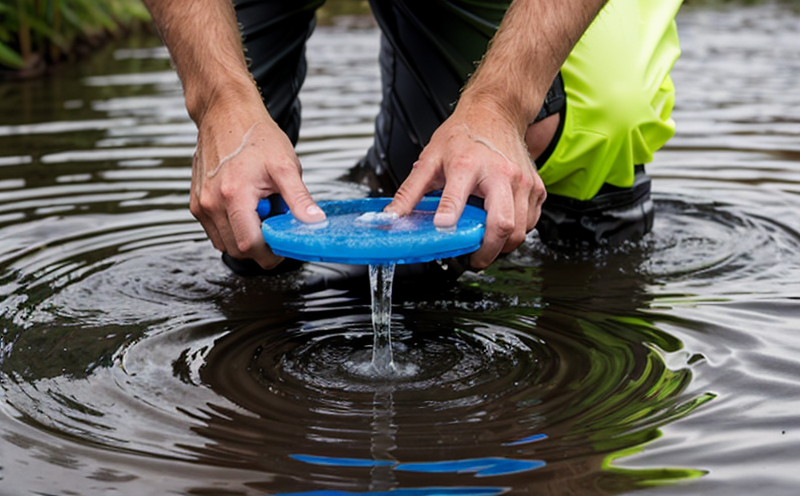ISO 11923 Suspended Solids Testing
The ISO 11923 method is a robust and internationally recognized protocol used to determine suspended solids in surface water. This test is crucial for ensuring compliance with environmental regulations, safeguarding public health, and maintaining the quality of drinking water. The procedure measures the total suspended matter present in water samples, which can include particles like silt, clay, and other organic or inorganic substances that do not dissolve.
The ISO 11923 method specifies a filtration technique using a membrane filter with a pore size of 0.45 micrometers, ensuring the accurate quantification of suspended solids down to this size. The test involves filtering an accurately measured volume of water through these membranes and then weighing the captured solids after drying them at a specific temperature.
This method is particularly important in sectors like municipal water treatment, industrial wastewater management, and environmental monitoring. Compliance with ISO 11923 helps organizations avoid costly penalties for non-compliance and enhances their reputation by demonstrating commitment to environmental stewardship.
| Key Parameters | Description |
|---|---|
| Filtration Volume | The volume of water filtered through the membrane, typically 100 mL. |
| Drying Temperature | The temperature at which filters are dried to constant weight, usually 103°C ±2°C. |
| Reagent Use | Pure water for rinsing the filter. |
- Filtration Efficiency: Achieving precise results requires meticulous filtration techniques.
- Sample Handling: Proper sample preparation ensures accurate readings.
- Data Interpretation: Understanding how suspended solids impact water quality is essential.
The ISO 11923 method is widely used in various sectors, including municipal water utilities and industrial facilities. Its standardization makes it a reliable tool for comparing results across different locations and time periods. By adhering to this protocol, organizations can ensure consistent and accurate measurement of suspended solids.
Industry Applications
The ISO 11923 Suspended Solids Testing method finds extensive application in the water & wastewater sector, particularly for surface water. This testing is crucial for ensuring that water meets regulatory standards and is safe for consumption or discharge.
| Industry | Application |
|---|---|
| Municipal Water Utilities | Monitoring compliance with drinking water quality standards. |
| Industrial Wastewater Management | Ensuring discharge limits are met and preventing pollution. |
| Environmental Monitoring | Tracking changes in surface water quality over time. |
- Municipal Utilities: Ensures that treated water meets WHO, EPA, and local regulations.
- Industrial Facilities: Prevents non-compliance with discharge limits set by regulatory bodies like the USEPA or EU directives.
- Environmental Agencies: Provides data for long-term ecological studies.
The test is also valuable in research and development to optimize water treatment processes. By understanding suspended solids levels, engineers can refine filtration techniques and enhance purification methods.
Eurolab Advantages
EuroLab offers unparalleled expertise in ISO 11923 Suspended Solids Testing, providing accurate and reliable results that meet international standards. Our team of specialists ensures consistent quality across all samples, delivering precise measurements every time.
- ISO Certification: Our laboratory is accredited to perform this test according to the strictest ISO guidelines.
- State-of-the-Art Equipment: We use high-precision instruments and advanced filtration systems to ensure accurate results.
- Experienced Technicians: Our staff has extensive experience in water testing, ensuring that every sample is handled with care and precision.
EuroLab's commitment to accuracy and reliability makes us the preferred choice for organizations needing ISO 11923 Suspended Solids Testing. We pride ourselves on providing not just results but actionable insights that help our clients make informed decisions.
Use Cases and Application Examples
The ISO 11923 Suspended Solids Testing method is versatile, with numerous applications across various sectors. Below are some specific use cases:
| Use Case | Description |
|---|---|
| Municipal Water Quality Monitoring | Regular testing ensures that drinking water meets regulatory standards. |
| Industrial Effluent Assessment | Ensures compliance with discharge limits and minimizes environmental impact. |
| R&D in Water Purification | Optimizing filtration techniques to achieve higher purity levels. |
| Environmental Impact Assessments | Tracking changes in water quality over time for ecological studies. |
- Municipal Water Quality Monitoring: Regular sampling and testing help maintain the safety of drinking water.
- Industrial Effluent Assessment: Ensures compliance with discharge limits, protecting aquatic ecosystems.
- R&D in Water Purification: Refining filtration methods to improve purification processes.
- Environmental Impact Assessments: Provides data for long-term ecological studies and policy-making.
EuroLab's ISO 11923 Suspended Solids Testing service is tailored to meet the specific needs of each client, whether it be routine monitoring or complex research projects. Our comprehensive approach ensures that clients receive accurate, reliable results that are essential for informed decision-making.





